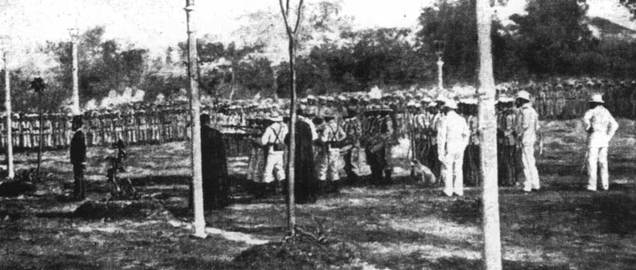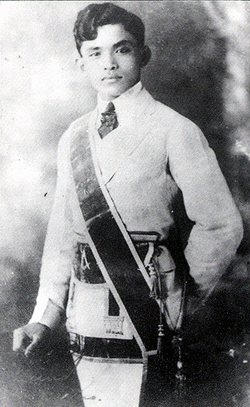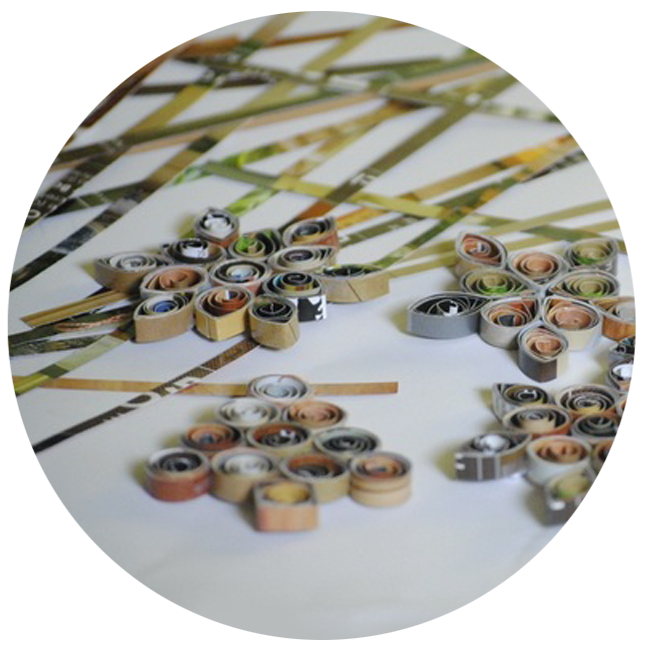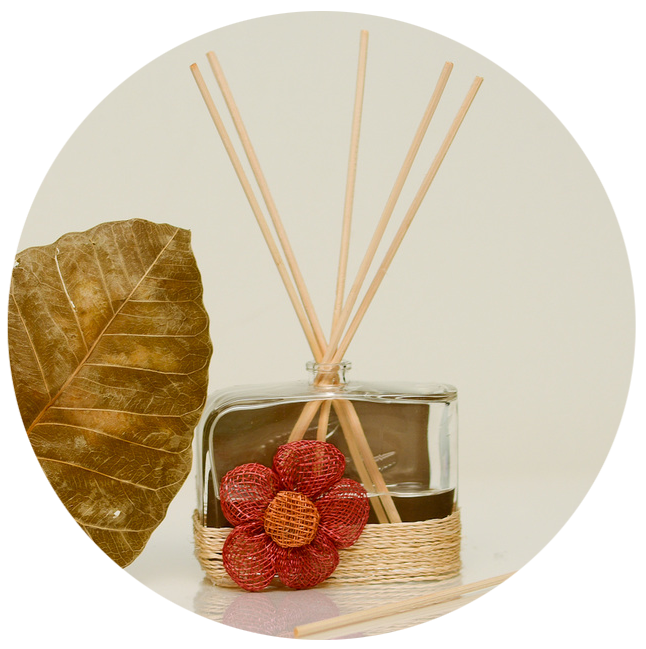The poem originally did't have a title. His friend Mariano Ponce gave it the title of Mi Último Pensamiento, (Mi Ultimo Adios) literally translated to English as My Last Farewell. The Inquirer has a news story last December 30, 2002:
On the afternoon of Dec. 29, 1896, a day before his execution, Dr. Jose Rizal was visited by his mother, Teodora Alonzo, sisters Lucia, Josefa, Trinidad, Maria and Narcisa, and two nephews. When they took their leave, Rizal told Trinidad in English that there was something in the small alcohol stove (cocinilla), not alcohol lamp (lamparilla). The stove was given to Narcisa by the guard when the party was about to board their carriage in the courtyard. At home, the Rizal ladies recovered from the stove a folded paper. On it was written an unsigned, untitled and undated poem of 14 five-line stanzas. The Rizals reproduced copies of the poem and sent them to Rizal's friends in the country and abroad. In 1897, Mariano Ponce in Hong Kong had the poem printed with the title "Mi Ultimo Pensamiento." Fr. Mariano Dacanay, who received a copy of the poem while a prisoner in Bilibid(jail), published it in the first issue of La Independencia on Sept. 25, 1898 with the title "Ultimo Adios." N.B. The stove was not delivered until after the execution. Rizal needed it to light the room and to be able to write the poem and his other parting words. VGPas 10/21/08.
My Last Farewell
Farewell, dear Fatherland, clime of the sun caress'd,
Pearl of the Orient seas, our Eden lost!
Gladly now I go to give thee this faded life's best,
And were it brighter, fresher, or more blest,
Still would I give it thee, nor count the cost.
On the field of battle, 'mid the frenzy of fight,
Others have given their lives, without doubt or heed;
The place matters not--cypress or laurel or lily white,
Scaffold of open plain, combat or martyrdom's plight,
'Tis ever the same, to serve our home and country's need.
I die just when I see the dawn break,
Through the gloom of night, to herald the day;
And if color is lacking my blood thou shalt take,
Pour'd out at need for thy dear sake,
To dye with its crimson the waking ray.
My dreams, when life first opened to me,
My dreams, when the hopes of youth beat high,
Were to see thy lov'd face, O gem of the Orient sea,
From gloom and grief, from care and sorrow free;
No blush on thy brow, no tear in thine eye
Dream of my life, my living and burning desire,
All hail! cries the soul that is now to take flight;
All hail! And sweet it is for thee to expire;
To die for thy sake, that thou mayst aspire;
And sleep in thy bosom eternity's long night.
If over my grave some day thou seest grow,
In the grassy sod, a humble flower,
Draw it to thy lips and kiss my soul so,
While I may feel on my brow in the cold tomb below
The touch of thy tenderness, thy breath's warm power.
Let the moon beam over me soft and serene,
Let the dawn shed over me its radiant flashes,
Let the wind with sad lament over me keen;
And if on my cross a bird should be seen,
Let it trill there its hymn of peace to my ashes.
Let the sun draw the vapors up to the sky,
And heavenward in purity bear my tardy protest;
Let some kind soul o'er my untimely fate sigh,
And in the still evening a prayer be lifted on high
From thee, O my country, that in God I may rest.
Pray for all those that hapless have died,
For all who have suffered the unmeasur'd pain;
For our mothers that bitterly their woes have cried,
For widows and orphans, for captives by torture tried;
And then for thyself that redemption thou mayst gain.
And when the dark night wraps the graveyard around,
With only the dead in their vigil to see;
Break not my repose or the mystery profound,
And perchance thou mayst hear a sad hymn resound;
'Tis I, O my country, raising a song unto thee.
When even my grave is remembered no more,
Unmark'd by never a cross nor a stone;
Let the plow sweep through it, the spade turn it o'er,
That my ashes may carpet thy earthly floor,
Before into nothingness at last they are blown.
Then will oblivion bring to me no care,
As over thy vales and plains I sweep;
Throbbing and cleansed in thy space and air,
With color and light, with song and lament I fare,
Ever repeating the faith that I keep.
My Fatherland ador'd, that sadness to my sorrow lends,
Beloved Filipinas, hear now my last good-by!
I give thee all: parents and kindred and friends;
For I go where no slave before the oppressor bends,
Where faith can never kill, and God reigns e'er on high!
Farewell to you all, from my soul torn away,
Friends of my childhood in the home dispossessed!
Give thanks that I rest from the wearisome day!
Farewell to thee, too, sweet friend that lightened my way;
Beloved creatures all, farewell! In death there is rest!
Farewell, dear Fatherland, clime of the sun caress'd,
Pearl of the Orient seas, our Eden lost!
Gladly now I go to give thee this faded life's best,
And were it brighter, fresher, or more blest,
Still would I give it thee, nor count the cost.
On the field of battle, 'mid the frenzy of fight,
Others have given their lives, without doubt or heed;
The place matters not--cypress or laurel or lily white,
Scaffold of open plain, combat or martyrdom's plight,
'Tis ever the same, to serve our home and country's need.
I die just when I see the dawn break,
Through the gloom of night, to herald the day;
And if color is lacking my blood thou shalt take,
Pour'd out at need for thy dear sake,
To dye with its crimson the waking ray.
My dreams, when life first opened to me,
My dreams, when the hopes of youth beat high,
Were to see thy lov'd face, O gem of the Orient sea,
From gloom and grief, from care and sorrow free;
No blush on thy brow, no tear in thine eye
Dream of my life, my living and burning desire,
All hail! cries the soul that is now to take flight;
All hail! And sweet it is for thee to expire;
To die for thy sake, that thou mayst aspire;
And sleep in thy bosom eternity's long night.
If over my grave some day thou seest grow,
In the grassy sod, a humble flower,
Draw it to thy lips and kiss my soul so,
While I may feel on my brow in the cold tomb below
The touch of thy tenderness, thy breath's warm power.
Let the moon beam over me soft and serene,
Let the dawn shed over me its radiant flashes,
Let the wind with sad lament over me keen;
And if on my cross a bird should be seen,
Let it trill there its hymn of peace to my ashes.
Let the sun draw the vapors up to the sky,
And heavenward in purity bear my tardy protest;
Let some kind soul o'er my untimely fate sigh,
And in the still evening a prayer be lifted on high
From thee, O my country, that in God I may rest.
Pray for all those that hapless have died,
For all who have suffered the unmeasur'd pain;
For our mothers that bitterly their woes have cried,
For widows and orphans, for captives by torture tried;
And then for thyself that redemption thou mayst gain.
And when the dark night wraps the graveyard around,
With only the dead in their vigil to see;
Break not my repose or the mystery profound,
And perchance thou mayst hear a sad hymn resound;
'Tis I, O my country, raising a song unto thee.
When even my grave is remembered no more,
Unmark'd by never a cross nor a stone;
Let the plow sweep through it, the spade turn it o'er,
That my ashes may carpet thy earthly floor,
Before into nothingness at last they are blown.
Then will oblivion bring to me no care,
As over thy vales and plains I sweep;
Throbbing and cleansed in thy space and air,
With color and light, with song and lament I fare,
Ever repeating the faith that I keep.
My Fatherland ador'd, that sadness to my sorrow lends,
Beloved Filipinas, hear now my last good-by!
I give thee all: parents and kindred and friends;
For I go where no slave before the oppressor bends,
Where faith can never kill, and God reigns e'er on high!
Farewell to you all, from my soul torn away,
Friends of my childhood in the home dispossessed!
Give thanks that I rest from the wearisome day!
Farewell to thee, too, sweet friend that lightened my way;
Beloved creatures all, farewell! In death there is rest!





















